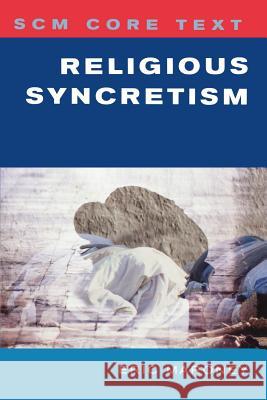Scm Core Text: Religious Syncretism » książka
Scm Core Text: Religious Syncretism
ISBN-13: 9780334040187 / Angielski / Miękka / 2006 / 222 str.
The teacher who uses this book in a course... has a great opportunity here to bring history to life and to show nuances concerning religious stereotypes which are not based on historic fact --Tijdschrift voor Theologie, (Journal for Theology) 2008: 48, 117 The SCM Core Text Religious Syncretism provides a persuasive account of the principle that syncretism is an important and widespread expression of religious belief and practice. Each chapter concludes with a useful summary and questions that might be considered for seminar or class discussion.... there is much to commend the book. Those of us who work in education can be accustomed to think of religion in terms of creeds and doctrines and to teach the subject along those lines. Such an approach is to ignore the importance of syncretistic experience as a defining factor in religion. --Elliot Shaw, Senior Lecturer, Religious Education at St. Martin's College, in the journal World Religions in Education, XXVIII, 2007-8. Even a quick scan of today's headlines makes clear that the growth of fundamentalist versions of Islam is having a vast impact on our world. For Americans the rise of Christian fundamentalism, especially the Evangelical movement, is also socially and politically shaping the country, as debates about abortion, stem cell research and other important issues are often driven by fundamentalist notions. In profound ways, orthodox versions of Judaism have altered the fabric of Middle Eastern politics through the Israeli-Palestinian conflict, especially regarding settlements in Gaza and the West Bank, making peace there all the more difficult, and further destabilizing an already unstable region. The rise of fundamentalism in the three monotheistic faiths is fully examined in this textbook. It is not about fundamentalism however, it is about its opposite trend: religious syncretism. Syncretism describes the phenomenon of one religion borrowing elements from another, and it is part of religion that fundamentalists will seldom acknowledge. This textbook explores Judaism, Christianity and Islam, using compelling examples of how syncretism works and looks, to show how these three religions have adopted customs and conceptions of other religions, most often acquiring practices from pagan predecessors and neighbours. The book shows how these three faiths - despite how modern media would have us believe - have been willing, at various times and places, to borrow.
The teacher who uses this book in a course... has a great opportunity here to bring history to life and to show nuances concerning religious stereotypes which are not based on historic fact --Tijdschrift voor Theologie, (Journal for Theology) 2008: 48, 117The SCM Core Text Religious Syncretism provides a persuasive account of the principle that syncretism is an important and widespread expression of religious belief and practice. Each chapter concludes with a useful summary and questions that might be considered for seminar or class discussion.... there is much to commend the book. Those of us who work in education can be accustomed to think of religion in terms of creeds and doctrines and to teach the subject along those lines. Such an approach is to ignore the importance of syncretistic experience as a defining factor in religion. --Elliot Shaw, Senior Lecturer, Religious Education at St. Martins College, in the journal World Religions in Education, XXVIII, 2007-8. Even a quick scan of todays headlines makes clear that the growth of fundamentalist versions of Islam is having a vast impact on our world. For Americans the rise of Christian fundamentalism, especially the Evangelical movement, is also socially and politically shaping the country, as debates about abortion, stem cell research and other important issues are often driven by fundamentalist notions. In profound ways, orthodox versions of Judaism have altered the fabric of Middle Eastern politics through the Israeli-Palestinian conflict, especially regarding settlements in Gaza and the West Bank, making peace there all the more difficult, and further destabilizing an already unstable region. The rise of fundamentalism in the three monotheistic faiths is fully examined in this textbook. It is not about fundamentalism however, it is about its opposite trend: religious syncretism. Syncretism describes the phenomenon of one religion borrowing elements from another, and it is part of religion that fundamentalists will seldom acknowledge. This textbook explores Judaism, Christianity and Islam, using compelling examples of how syncretism works and looks, to show how these three religions have adopted customs and conceptions of other religions, most often acquiring practices from pagan predecessors and neighbours. The book shows how these three faiths - despite how modern media would have us believe - have been willing, at various times and places, to borrow.











